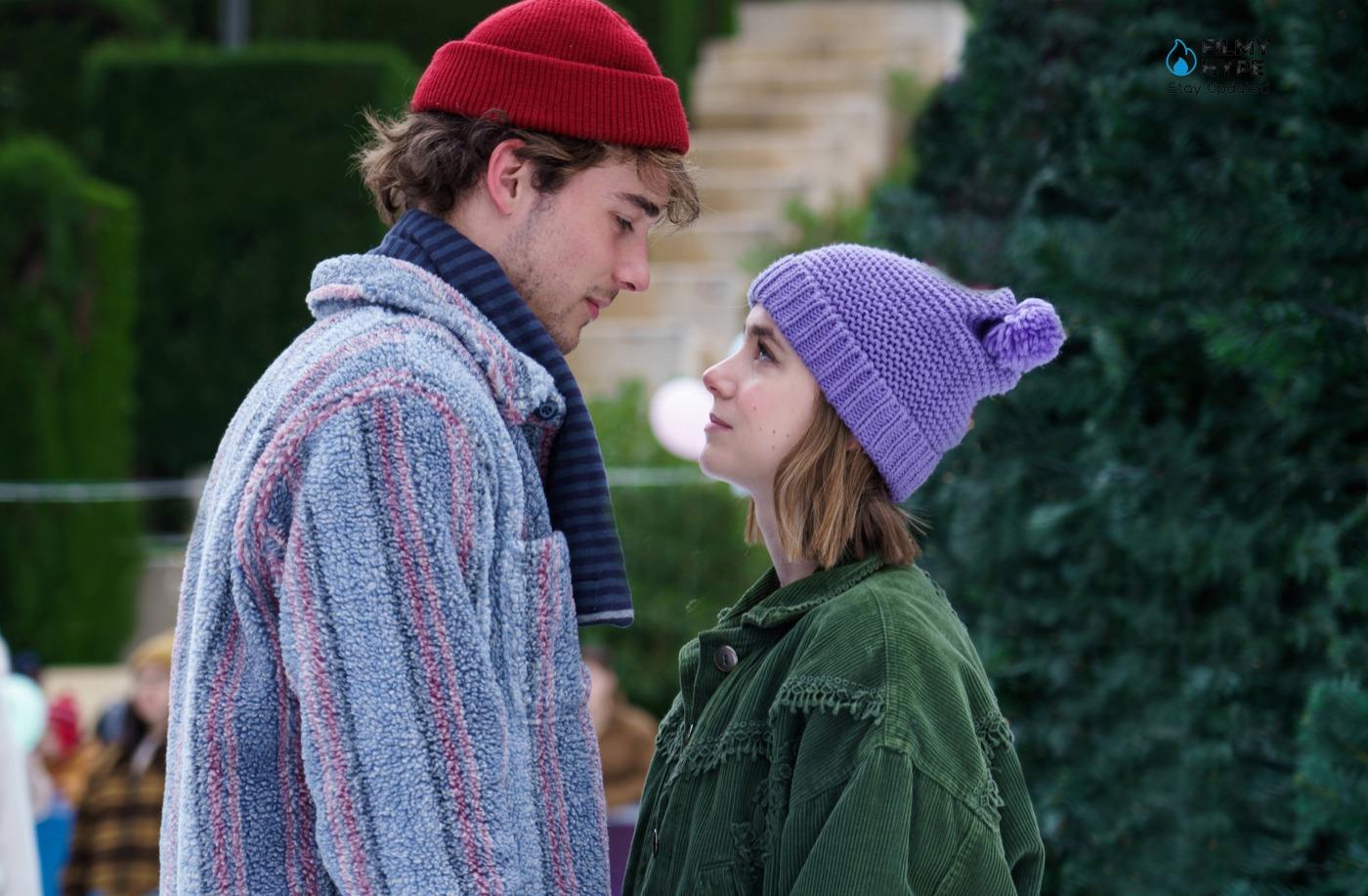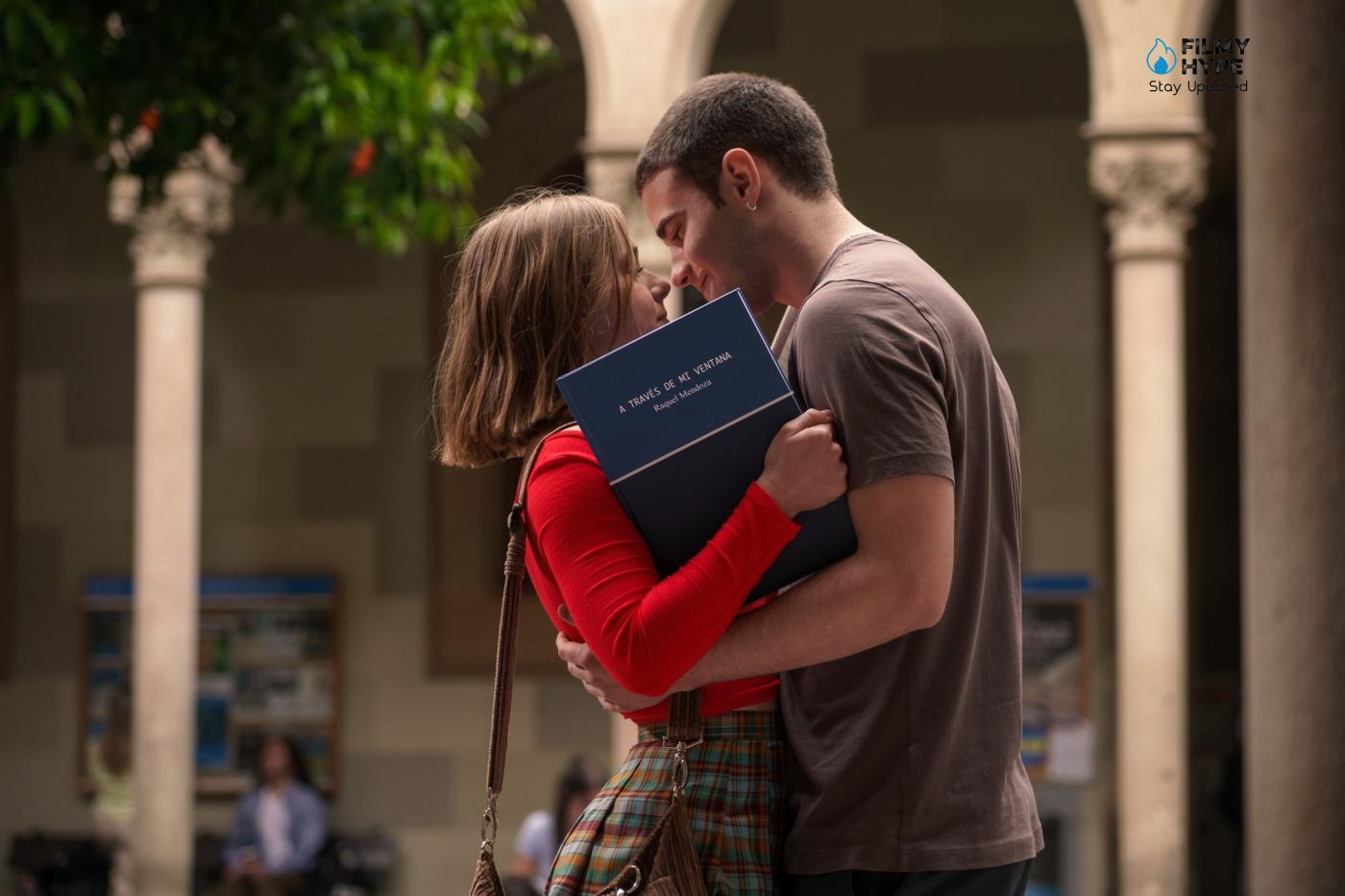Through My Window: Looking at You Review: Light, Smooth and Always Very Romantic The Right Ending For A Love Saga
Cast: Julio Peña Fernández, Clara Galle, Natalia Azahara, Andrea Chaparro, Eric Masip, Hugo Arbues and Ivan Lapadula Montes
Director: Marçal Forès
Streaming Platform: Netflix
Filmyhype.com Ratings: 3.5/5 (three and a half stars)
The Spanish romantic saga Through My Window (original title A través de tu mirada) is officially over. With the release on Netflix of the third and final chapter of Through My Window: Looking at You we will say goodbye to the two great protagonists of this story, Ares and Raquel, a couple who have entered the hearts of all fans of romantic comedies and who have dream and despair at the same time. One of Netflix’s most successful rom-coms comes to an end, a film adaptation of Ariana Godby’s romance novels launched, for the first time, in 2022 with the first film followed by the first sequel in 2023 and, finally, the grand finale arrived on Netflix on February 23, 2024. But what can we say about this third chapter of the Through My Window saga? Through My Window: Looking at You, how is it compared to previous films, and, above all, how does the love story between Ares and Raquel end? Before revealing it, let’s do a little recap on the plot of the third film of the Through My Window saga.

The last chapter of the trilogy of films based on the saga by Ariana Godoy, a writer initially self-published on the Wattpad platform, arrives on Netflix. After Through My Window and Through My Window: Across the Sea, the streaming giant welcomes Through My Window: Looking at You, which finally sees the love misadventures of neighbors to lovers, Raquel and Ares, come to a close. We had not left them at a particularly idyllic moment in their relationship, after the sudden death of their friend Yoshi, things had definitively gone to pieces for the two: if the situation seems irreparable – we find both of them “happily” coupled with other people – the feelings and passion that have linked them from the beginning will soon make themselves felt again.
If in the first two chapters of the story conflicts and obstacles to the love of the two were innumerable, in this third film there is no real reason to keep them separated: there is never any doubt that they cannot get back together, and in fact when this happens the situation is so anticlimactic that it leaves the viewer almost indifferent. We already knew it would end like this. Looking back, therefore, the only one of the three films that had a certain weight from a narrative point of view was the first, capable of supporting itself, the second is a clear filler to lengthen the story (and create an unnecessary conflict in the couple) while waiting for the third which, as we will, unfortunately, see in this review of Through My Window: Looking at You, is however so poor in content as to have little appeal, we are sure, even on the young adult audience which is its reference target (and who have probably read the novels from which these films are based).
Through My Window: Looking at You Review: The Story Plot
The film opens a few months after the previous one ended: Raquel (Clara Galle) is happily engaged to Gregory (Ivan Lapadula Montes), Ares (Julio Peña Fernández) to Vera (Andrea Chaparro). Both seem only apparently happy and satisfied: our protagonist is about to see her first novel published but she still secretly spies on her handsome neighbor from her window; he, however, is the pride of her family for having brought Eva among them, her rich parents are in fact about to make a multi-million-dollar agreement with the Hidalgo company. Even for him, however, her attraction towards her neighbor seems irresistible, and despite doing everything he can to stay away from her, he only crosses paths with her and thinks of her.

The Christmas holidays, the most magical moment of the year, will bring them back on each other’s path: if on the one hand, Raquel realizes that the kind and present Gregory would be the best choice, on the other she cannot forget his first and only love, Ares. He feels obligated towards the family business, breaking up with Vera could ruin the agreement… but how can he control such overwhelming feelings? The heart cannot be commanded, we know this, and it will be of little value for Ares and Raquel to give in to the call of passion…
Through My Window: Looking at You Review and Analysis
Through My Window: Looking at You leaps in quality compared to the films that preceded it, especially the second chapter which was rather disappointing. This time, Marçal Forés, director of the entire Spanish romantic saga, wanted to make his characters grow but also the film itself, demonstrating greater maturity in writing and performance on the screen. Although Through My Window: Looking at You remains a simple film and certainly not a masterpiece, we appreciated the director’s attempt to do something more in this ending which, all things considered, is pleasant and does justice to the stories of its characters. The two great protagonists of the story return: Ares and Raquel, both struggling with new lives and new relationships but with that thread that binds them despite everything. The two will be faced with important choices and will have to face their feelings and their inner demons to understand which direction to go in their individual and couple lives.
Through My Window: Looking at You adds a bit of eroticism to the story with several sex scenes that cannot be missing in a romantic saga, it becomes more fluid and also gives space to the secondary characters to carry on their storylines thus making the story, a little more choral and less monothematic. The direction, the screenplay, and the characters are growing and they will become more aware of who they are and what they want for themselves and in love. Light, smooth, and always very romantic, Through My Window: Looking at You is the right ending for a love saga that, until now, had kept the handbrake on a bit. As we anticipated at the beginning Through My Window: Looking at You is a conclusion that has very little to tell: the conflicts created after the end of the first film seem to be just ploys of the screenplay to lengthen the plot, to carry forward a shaky story with the sole purpose to pique the attention of the public who had appreciated the story of Ares and Raquel.

In our opinion, the path taken by Netflix to transpose Godoy’s story does not work as hoped: the author, in her trilogy, had dedicated a different novel to each Hidalgo brother – Ares, Artemis, and Apolo – concluding the story of Ares and Raquel in the first. The streaming giant, perhaps considering the relationship between Ares and Raquel more interesting and “sellable”, decided to focus everything on them, leaving in the background those who should have been the new protagonists, at least as the author had decided. The conflicts, the twists, and the endless push and pull that form the skeleton of the second and especially the third film are therefore really not very intriguing and justified, they do not have the right weight to keep the story interesting and involve the viewer. The ending, consequently, ends up being so predictable that it fails to truly excite us.
Among the reasons that made Ares a tormented soul, there had always been the family that was far too dedicated to business, to money, to affairs. The three Hidalgo brothers had always suffered the pressure of appearing and satisfying their parents’ expectations, especially their father’s, concerning the future of society. Among the narrative lines undertaken in the second chapter, there was the beginning of rebellion on the part of the eldest son and therefore the first heir of the family business, Artemis (Eric Masip), in love with Claudia, one of the housekeepers of his job. We find them waiting for a little girl, whose birth is ready to definitively break the impossible but desired balance that Artemis would like to be able to maintain between her father’s wishes and the opposing values of her family with the woman he loves.

Following him on this inevitable path of rupture is also Ares, whose choices were made too much out of family pressure but too little out of love. Through My Window: Looking at You manages to close the circle of Artemis’ path by placing her liberation from her paternal hegemony alongside that of Ares. The story of Ares and Raquel had to end with the first film and perhaps dedicating the subsequent ones to the other two Hidalgo brothers would have been the best choice to be appreciated by the young audience who has read and loved Gogoy’s novels. In Through My Window: Looking at You we find Ares and Raquel in the aftermath of their separation and after the tragic epilogue of the second film, with the violent death of Yoshi, the girl’s best friend. They both have a new person next to them. For Ares, the choice fell on Vera (Andrea Chaparro), the primary cause of the breakup between him and Raquel, while the latter gave a chance to Gregory, who has always been her supporter and suitor.
The toxic, passionate, and romantic love between Raquel and Ares was born the first book written by the girl, which ended up in the hands of a publishing house thanks to the unforgettable Yoshi. The content of the second book commissioned from Raquel is inevitably linked to the fate of history with its Greek God. The unique feeling that binds the two is never questioned and the trailer itself declares it without hesitation. What will stop the two from getting back together in the second minute of their meeting in Barcelona? A film that is structured precisely to generate desire and nostalgia in the viewer. As was the case with After, the Through My Window saga also decides, without attempting derailments, to take the safest path and return exactly to where it started: Raquel and Ares, take it or leave it.
Through My Window: Looking at You Review: The Last Words
Through My Window: Looking at You is somewhat disappointing and lacking in emotion final chapter. The feeling is that an attempt was made to squeeze and lengthen a story that could easily have been concluded in the first film. The last chapter taken from the trilogy of novels by Ariana Godoy and directed again by Marçal Forés, we note that the film does not bring any surprises to what we expected. As in the case of the After saga, the American cousin of this Spanish story, there is no escape from the mechanism of first love which has no rivals and from which one always returns, even if it is toxic. Around this certainty, this third chapter offers some moments of enjoyable romance not to be missed.






